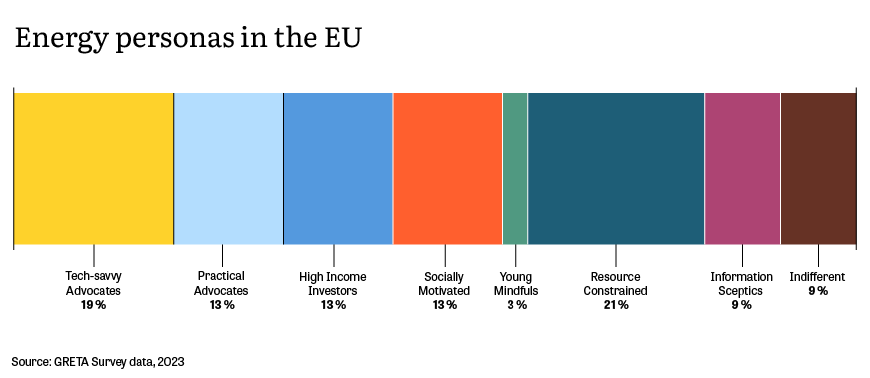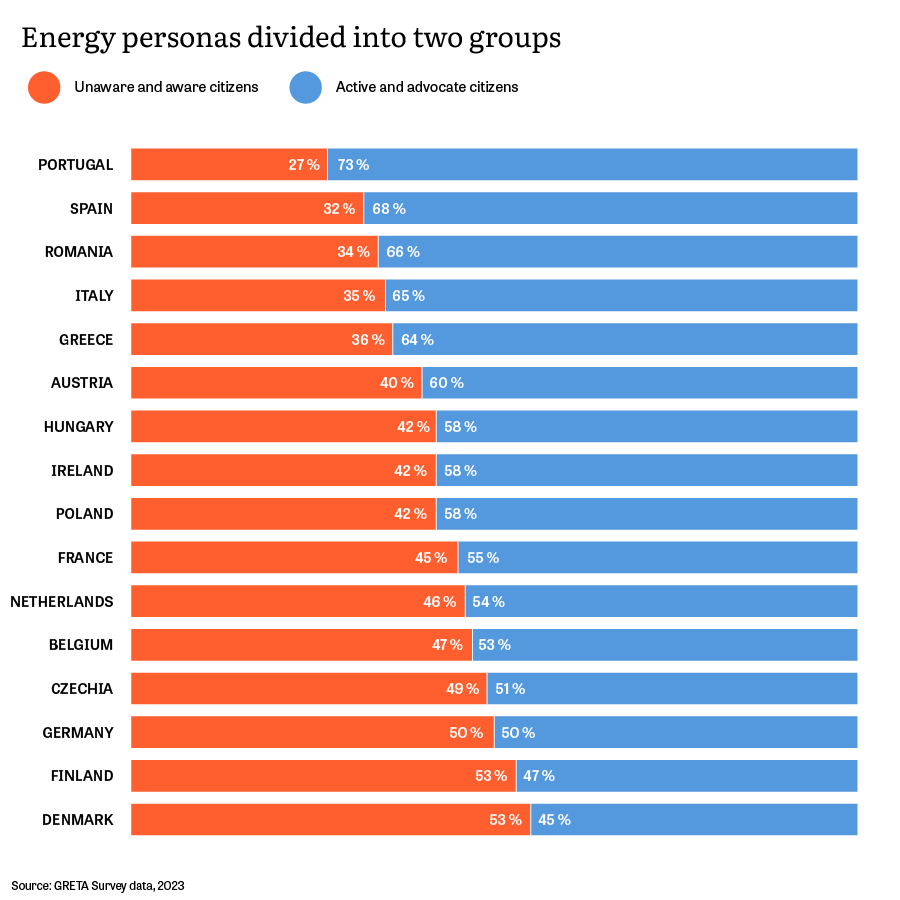Over half of EU citizens are already participating actively in the energy transition, reveals an EU-wide survey. However, the study shows great variations between countries and major barriers that prevent more impactful energy actions.
The European citizens are divided in their energy activities: around 60% of EU citizens are already participating in the energy transition but the rest are being left behind. This is revealed by an EU-wide multinational survey produced by a Horizon research project GRETA (GReen Energy Transition Actions).
“To get the rest onboard and the already active citizens to do more is definitely possible, but not with the business as usual approach. It requires the policy-makers to promote both an enabling and financially incentivising regulation framework and cultural shift towards energy transition. Our research also reveals a dire need for funding programs for digital solutions and platforms that enable digital energy communities and dialogues that acknowledge citizens’ contributions to the energy transition,” says Ajesh Kumar, Junior Researcher at the LUT University in Finland.
From the survey data of approximately 10,000 participants in 16 EU countries, GRETA has identified eight persona types that differentiate the EU citizens based on their attitudes and behaviour relating to the energy transition. The personas differ from each other in how actively they participate in the energy transition, and by their attitudes, motivations and resources towards sustainable energy actions. The eight personas are from the most to the least active: Tech-savvy Advocates, Practical Advocates, High Income Investors, Socially Motivated, Young Mindfuls, Resource Constrained, Information Sceptics, and Indifferents.

The analysis shows that 58% of the EU citizens – people included in the four last mentioned personas – are already what the GRETA researchers call “active” or “advocate” level energy citizens. That is, they are already participating in the energy transition, for example by doing simple energy saving activities in their everyday life, investing in green energy technologies or actively advocating for greener energy solutions. For example, every fifth citizen can be described as a Tech-Savvy Advocate, who tend to be interested in trying new energy technologies.
“The good news is that many are already doing something to enable the transition, like opting for green electricity or using energy efficient appliances. However, our research shows major barriers that prevent bigger and more impactful energy actions, such as forming energy communities or investing in new cleaner technologies,” says Kumar.
EU citizens expect national governments to take responsibility in the energy transition
Based on GRETA’s survey, over 60% of EU citizens agree that the energy transition is a joint task in which everyone in society should make a contribution. However, not everyone has yet equal opportunities to participate.
In fact, around 40% of the EU citizens can be classified as Indifferents, Information Sceptics, Resource Constrained or Young Mindfuls which are all unlikely to increase their engagement without further support. For example, a fifth of the citizens belong to Resource Constrained, who are aware of energy issues but put their trust in science to fix the problem. They may be interested in saving energy, but have limited resources to make big investments themselves.
Based on GRETA’s case studies and the multinational survey, the biggest barriers for citizens’ further engagement are financial constraints, lack of knowledge and the attitude that one person cannot make a difference. Most people still expect their governments to play a strong role in their nation’s energy efficiency and conservation policies.
Enabling national regulation led Portugal to strengthen citizen engagement
The data also shows differences between countries. Of all the studied 16 EU countries, Portugal has the most energy transition advocates accounting in total for 50% of the citizens. The country also has the least Indifferents, who are not concerned about climate issues at all. In comparison, the biggest share of Indifferents and Information sceptics, who also lack motivation towards climate actions, are found in Denmark (30%), Germany (26%) and Czechia (26%).
“In 2019 policymakers on the national level of governance in Portugal introduced modifications to the self-consumption regime of renewable electricity. This way they supported the forming of Renewable Energy Communities (RECs), individual and collective self-consumption of energy, and peer-to-peer energy trading. This is a good example of how a member state managed to implement an enabling national regulatory framework based on the 2018 EU Renewable Energy Directive,” says Associate Professor Annika Wolff at LUT University, the director of GRETA.

About the study
GRETA’s results draw on data from a multinational survey with approximately 10,000 participants across 16 EU countries, as well as six case studies conducted in Italy, Spain, Portugal, Germany, the Netherlands, and multinationally in the EU.
The multinational survey was conducted in September – October 2022 in 16 EU countries including Austria, Belgium, Czechia, Denmark, Finland, France, Greece, Germany, Hungary, Ireland, Italy, the Netherlands, Poland, Portugal, Romania, and Spain. The survey received approximately 10,000 answers.
The sample size of the multinational survey corresponds to a margin of error of approximately 1% with a confidence level of 95% (at EU level). The sample for citizens follows specific quotas for age, gender, and geographical distribution to ensure representativeness of the sample within each country.
Read more about energy citizen personas and GRETA’s results and data.
About GRETA
Since 2021, EU Horizon project GRETA (2021-23) has studied energy citizenship and energy communities. Energy citizenship means that citizens can use energy in a sustainable way to move towards active participation in the energy transition. GRETA has studied how energy citizenship works in different contexts and geographical levels, and what kind of knowledge, social structures, technology or financial resources are needed to make an active energy citizen. The goal of the project is to enhance energy citizenship emergence by increasing awareness and removing policy barriers within the European Union.
Additional information
Junior Researcher Ajesh Kumar, LUT University
ajesh.kumar@lut.fi
Associate Professor Annika Wolff, LUT University
annika.wolff@lut.fi

